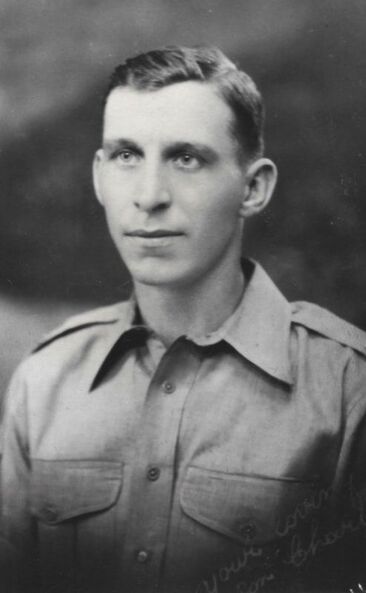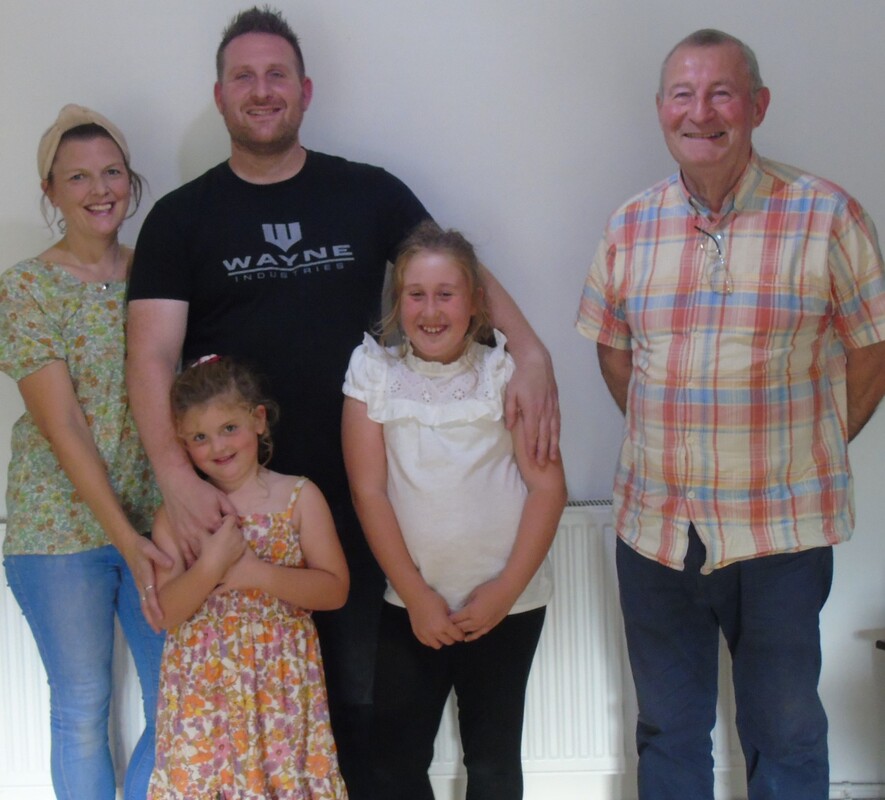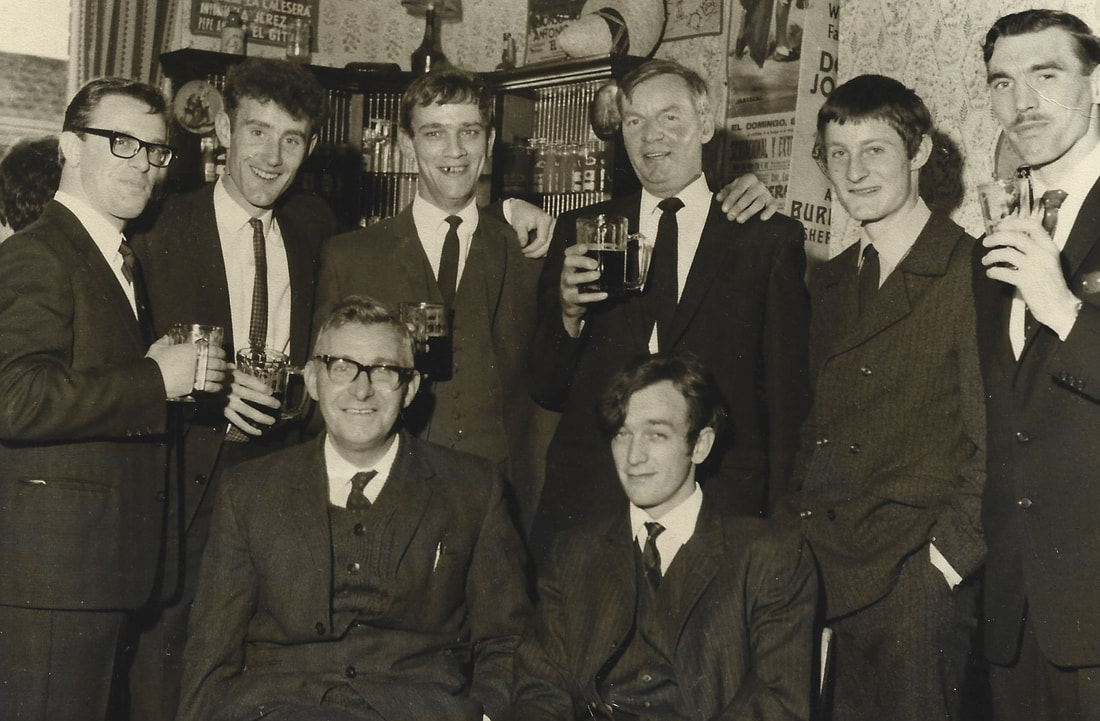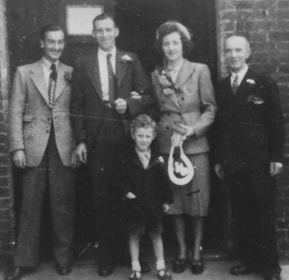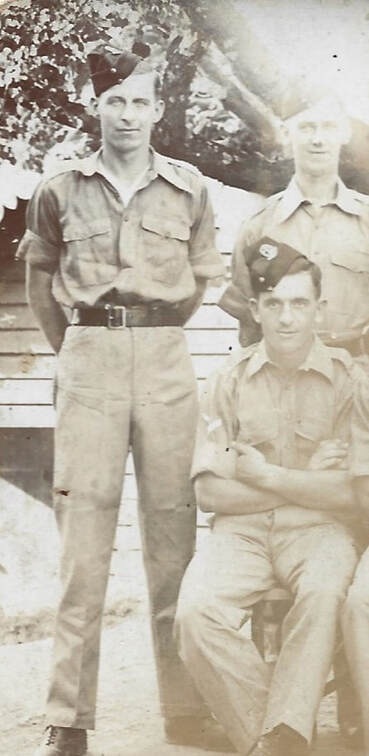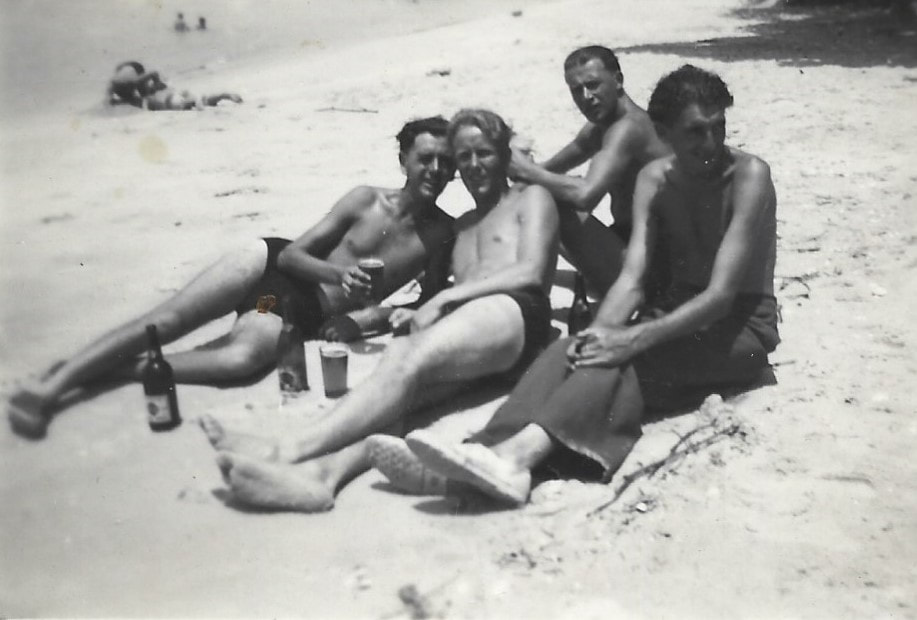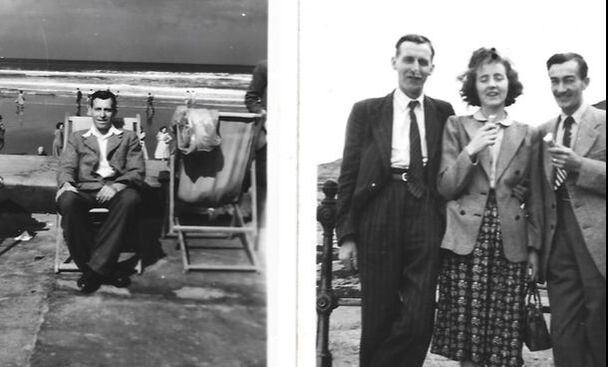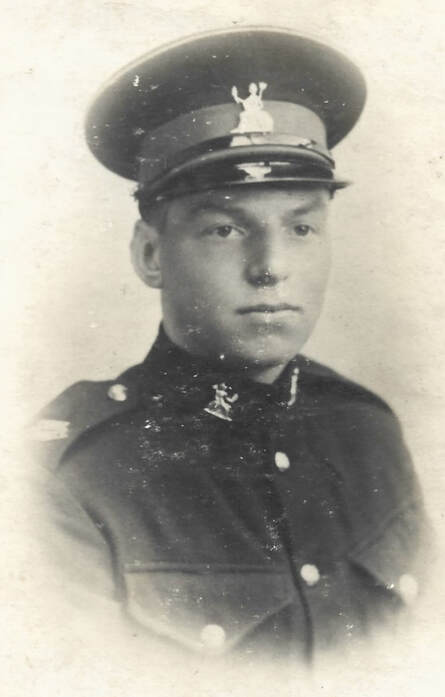Private Charles "Charlie" Wooltorton
Private Charles "Charlie" Wooltorton of the Royal Norfolk Regiment was involved in fighting the enemy in and around Le Paradis and was taken prisoner of war, spending the last five years of the conflict on the 1,000 mile march and ending up in Stalag VIII. He made it back to England when the war ended after the camp was liberated by Russian troops as the Germans fled.
Charlie experienced considerable hardships after being captured and suffered from stomach problems for the rest of his life - possibly caused by a very poor diet that at times mainly consisted of potato peelings and very little drink.
Employment as a prisoner included hard labour at a cement works. Charlie later put some of his memories down in an application to a tribunal for an additional war pension. It was 21 years later that he wrote the following:
"Was slightly wounded when taken prisoner, was on the march through France, starved for 5 years. The British Red Cross saved our lives, had stomach trouble in Germany."
Charlie went on to give a description of his life and the lead up to his capture (Editor's Note - the following was written for the pension tribunal in November 1966, more than 26 years after the May 1940 massacre. It is likely that he got a number of facts mixed up. We are sure from our research that Charlie was not in the massacre but was fighting in and around Le Paradis and is likely to have been one of the troops inside HQ in Duriez Farm. It seems almost certain that Major Ryder gave the troops three choices - to surrender together, to go out of a side door or to take their chances by making an escape. We believe Charlie took the latter option which is how he came to be in a canal where he came under attack from German troops. We include his account in full without alterations as an important historic document with regards to the fighting in the area around Le Paradis).
"I served seven years with the Norfolk Regiment, about 6 years abroad and enjoyed good health in India. When I arrived home in England 1939 I went on a coach building course and the Army got me a good job. I was recalled September 1939 and in France about a month later. I was slightly wounded and was being taking back by Jimmy Needham and Clinkney at the village Le Paradis (Editor's note - Jimmy Needham was killed in the action and is buried in Le Paradis Cemetery).
"The SS troops put the Bren gun carrier out of action and lined the three of us up on the road and fired at us with the Tommy gun. I fell back in the canal with my mouth just out of the water and remained still. I laid in the water all day waiting for dusk, but a German patrol came along and the one in charge tried to hit me on the head with his stick grenade. I warded it off with my left arm and then he saw I was covered with blood, he said Gerwounder Yeah and got a rifle and bannet (bayonet) from one of the others and took me to a farmhouse where they lined us up facing the wall of the buildings and I'm sure they were going to mow us down. Major Ryder stepped into the middle of the farmyard and gave a speech and I'm certain this is what saved other lives.
"From this time onwards I had a bad time. I had lost a fair amount of blood that with no food and marching 20 and 30 miles a day for weeks, picking up prisoners and if one dropped out they shot him. They put us in cattle trucks which we were in three days without getting out we arrived at a station which was about 4 miles to the POW camp, life here was hell. They lined you up facing sun for your rations about 7.30 in morning and moved with the sun till about 8.30 at night for about 5 spuds and 1 round of black bread every day...... Life as a POW ruined my health and nerves."
His wife was in no doubt at the tribunal about what had caused illnesses suffered when he returned from the war.
"It was how he was treated in the German prison camp that ruined his health. Filthy old boiled potatoes and German bread and he finished up with a nervous stomach and he worked in a cement factory lifting cement bags 7 days a week and also living in filth and squalor and he was lucky when he jumped into a canal when they shot 100 soldiers. That's how he got injured.
"To keep them clean they used to march them to a river which was miles away in Poland and break the ice and they had to jump in and de-lice themselves and when they got back they would still sleep on the same filthy straw and he often had nightmares."
* * *
Charlie experienced considerable hardships after being captured and suffered from stomach problems for the rest of his life - possibly caused by a very poor diet that at times mainly consisted of potato peelings and very little drink.
Employment as a prisoner included hard labour at a cement works. Charlie later put some of his memories down in an application to a tribunal for an additional war pension. It was 21 years later that he wrote the following:
"Was slightly wounded when taken prisoner, was on the march through France, starved for 5 years. The British Red Cross saved our lives, had stomach trouble in Germany."
Charlie went on to give a description of his life and the lead up to his capture (Editor's Note - the following was written for the pension tribunal in November 1966, more than 26 years after the May 1940 massacre. It is likely that he got a number of facts mixed up. We are sure from our research that Charlie was not in the massacre but was fighting in and around Le Paradis and is likely to have been one of the troops inside HQ in Duriez Farm. It seems almost certain that Major Ryder gave the troops three choices - to surrender together, to go out of a side door or to take their chances by making an escape. We believe Charlie took the latter option which is how he came to be in a canal where he came under attack from German troops. We include his account in full without alterations as an important historic document with regards to the fighting in the area around Le Paradis).
"I served seven years with the Norfolk Regiment, about 6 years abroad and enjoyed good health in India. When I arrived home in England 1939 I went on a coach building course and the Army got me a good job. I was recalled September 1939 and in France about a month later. I was slightly wounded and was being taking back by Jimmy Needham and Clinkney at the village Le Paradis (Editor's note - Jimmy Needham was killed in the action and is buried in Le Paradis Cemetery).
"The SS troops put the Bren gun carrier out of action and lined the three of us up on the road and fired at us with the Tommy gun. I fell back in the canal with my mouth just out of the water and remained still. I laid in the water all day waiting for dusk, but a German patrol came along and the one in charge tried to hit me on the head with his stick grenade. I warded it off with my left arm and then he saw I was covered with blood, he said Gerwounder Yeah and got a rifle and bannet (bayonet) from one of the others and took me to a farmhouse where they lined us up facing the wall of the buildings and I'm sure they were going to mow us down. Major Ryder stepped into the middle of the farmyard and gave a speech and I'm certain this is what saved other lives.
"From this time onwards I had a bad time. I had lost a fair amount of blood that with no food and marching 20 and 30 miles a day for weeks, picking up prisoners and if one dropped out they shot him. They put us in cattle trucks which we were in three days without getting out we arrived at a station which was about 4 miles to the POW camp, life here was hell. They lined you up facing sun for your rations about 7.30 in morning and moved with the sun till about 8.30 at night for about 5 spuds and 1 round of black bread every day...... Life as a POW ruined my health and nerves."
His wife was in no doubt at the tribunal about what had caused illnesses suffered when he returned from the war.
"It was how he was treated in the German prison camp that ruined his health. Filthy old boiled potatoes and German bread and he finished up with a nervous stomach and he worked in a cement factory lifting cement bags 7 days a week and also living in filth and squalor and he was lucky when he jumped into a canal when they shot 100 soldiers. That's how he got injured.
"To keep them clean they used to march them to a river which was miles away in Poland and break the ice and they had to jump in and de-lice themselves and when they got back they would still sleep on the same filthy straw and he often had nightmares."
* * *
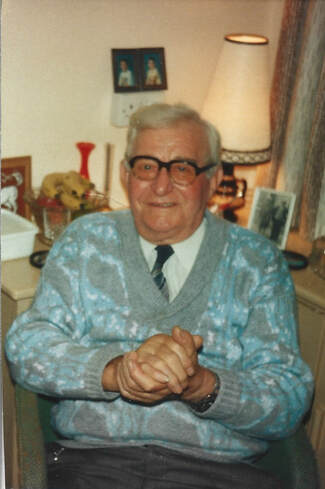
Charlie was born in Bungay, Suffolk, in 1911. Before joining the Royal Norfolks, he was a farm labourer. He signed up as Private 5770861 and served in the Norfolks from December 2nd, 1931, until 21st March, 1946.
Charlie was a country boy at heart, always whittling sticks and carving on them with his pen knife. He would often use these on walks with his beloved Collie Prince.
But there was a military background to Charlie's family. His father James Wooltorton also had a military career. Charlie signed up with the Norfolks because he wanted a career and "not work on other people's land."
He saw service in India from February 1933 until November 1938 and in France from September 20th, 1939 until he was captured and taken as a prisoner of war with a date given of 18th June, 1940. He was a prisoner of war until 21st May, 1945, when he returned to England after being liberated. Charlie died in Norwich in 1993 at the age of 82. His ashes are buried in Lakenham Cemetery just outside the city of Norwich.
It is recorded that Charlie suffered a shrapnel wound to his right arm in May 1940 which was gained whilst fighting in and around Le Paradis.
Today his son, also called Charles, lives just outside Norwich and close to his own son Ian, daughter-in-law Jo and granddaughters Clara and Etta.
In 2022, when Charles Junior was preparing to move home, he came across numerous photographs and other memorabilia belonging to his father. Some of this is either reproduced or used for this tribute page.
Charles Senior was 40 years old when his son was born in 1951, but the younger Charles scarcely remembers his father talking about the war.
"He avoided talking about the war and would change the subject. We know he spent five years in Stalag VIII where he received bad treatment and even had dogs set on him. I didn't realise the hell he had been through."
But Charles Junior remembers his father saying to him "you don't know what cold is" an obvious reference to his time as a prisoner of war. He also remembers his father being strict but a quiet man with his two sons. He believes once again that this was due to his military service. This all changed, however, when Charles Junior's wife Linda (nee Vincent) joined the family and with the arrival of grandchildren Ian and Dale.
Charles added that his father wouldn't accept any nonsense and at times had a short temper, again probably brought on from what he suffered in the war.
Ian Wooltorton remembers Charlie, however, as a very kind grandfather and somebody who was always physically very fit and strong until he had two strokes and a heart attack. Later on he developed lung cancer which he died from. He was cremated at Earlham but his ashes are buried at Lakenham Cemetery which was near his family home of 1 Manthorpe Close.
Ian also remembers Charles teaching him how to make paper boats. Charles was also a keen carpenter, making items in his shed. He had an allotment where he would grow vegetables that, amusingly, his wife refused to eat because they had dirt on them from being picked. This was a source of amusement for Charlie's family. Ian also remembers his grandfather turning two old toothbrushes into crochet sticks that he would use to make things out of leather. He would also make things from old cans and the family believe this passion came from his years in a prison camp where he regularly made something out of nothing.
Charles Junior remembers his father had an interest in finding out how things worked and a passion for wind-up clocks which he used to collect and also repair for friends and family. His interest in time also extended to collecting watches, something he has passed on to his son.
After being liberated, Charlie returned to England to stay with one of his sisters in Grove Road in Norwich. He was discharged from the Army allegedly in A1 condition but his sister said he had extreme difficulty carrying his kit bag into the house and she thought he was going to die.
After the war, Charles was quick to move back into Civvy street employment with jobs firstly with Mann Egerton as a coach builder, then as a carpenter before joining the GPO as a postman. He loved all kinds of sport and boxing in particular due to his time boxing in India. He also played darts, cards and draughts and enjoyed doing crossword puzzles. He was a keen traveller visiting Spain, France, Yugoslavia and the Channel Islands with his family and also holidaying regularly in the UK. He also rode a motorbike
On 30th July, 1949, Charles married Christina Boston from Norwich. They had been work colleagues at Mann Egerton. They adopted a son Raymond and later had Charles in 1951. When his beloved Christina died she was cremated and her ashes were interred with her husband in Lakenham Cemetery.
Charles was proud of his past despite rarely talking about it. He never wore his war medals but was a member of the Royal British Legion. He wore his military beret with pride whilst outside and was always fascinated by war and other memorials, finding out as much as he could about them and once again showing that he had an inquisitive mind.
Charlie was a country boy at heart, always whittling sticks and carving on them with his pen knife. He would often use these on walks with his beloved Collie Prince.
But there was a military background to Charlie's family. His father James Wooltorton also had a military career. Charlie signed up with the Norfolks because he wanted a career and "not work on other people's land."
He saw service in India from February 1933 until November 1938 and in France from September 20th, 1939 until he was captured and taken as a prisoner of war with a date given of 18th June, 1940. He was a prisoner of war until 21st May, 1945, when he returned to England after being liberated. Charlie died in Norwich in 1993 at the age of 82. His ashes are buried in Lakenham Cemetery just outside the city of Norwich.
It is recorded that Charlie suffered a shrapnel wound to his right arm in May 1940 which was gained whilst fighting in and around Le Paradis.
Today his son, also called Charles, lives just outside Norwich and close to his own son Ian, daughter-in-law Jo and granddaughters Clara and Etta.
In 2022, when Charles Junior was preparing to move home, he came across numerous photographs and other memorabilia belonging to his father. Some of this is either reproduced or used for this tribute page.
Charles Senior was 40 years old when his son was born in 1951, but the younger Charles scarcely remembers his father talking about the war.
"He avoided talking about the war and would change the subject. We know he spent five years in Stalag VIII where he received bad treatment and even had dogs set on him. I didn't realise the hell he had been through."
But Charles Junior remembers his father saying to him "you don't know what cold is" an obvious reference to his time as a prisoner of war. He also remembers his father being strict but a quiet man with his two sons. He believes once again that this was due to his military service. This all changed, however, when Charles Junior's wife Linda (nee Vincent) joined the family and with the arrival of grandchildren Ian and Dale.
Charles added that his father wouldn't accept any nonsense and at times had a short temper, again probably brought on from what he suffered in the war.
Ian Wooltorton remembers Charlie, however, as a very kind grandfather and somebody who was always physically very fit and strong until he had two strokes and a heart attack. Later on he developed lung cancer which he died from. He was cremated at Earlham but his ashes are buried at Lakenham Cemetery which was near his family home of 1 Manthorpe Close.
Ian also remembers Charles teaching him how to make paper boats. Charles was also a keen carpenter, making items in his shed. He had an allotment where he would grow vegetables that, amusingly, his wife refused to eat because they had dirt on them from being picked. This was a source of amusement for Charlie's family. Ian also remembers his grandfather turning two old toothbrushes into crochet sticks that he would use to make things out of leather. He would also make things from old cans and the family believe this passion came from his years in a prison camp where he regularly made something out of nothing.
Charles Junior remembers his father had an interest in finding out how things worked and a passion for wind-up clocks which he used to collect and also repair for friends and family. His interest in time also extended to collecting watches, something he has passed on to his son.
After being liberated, Charlie returned to England to stay with one of his sisters in Grove Road in Norwich. He was discharged from the Army allegedly in A1 condition but his sister said he had extreme difficulty carrying his kit bag into the house and she thought he was going to die.
After the war, Charles was quick to move back into Civvy street employment with jobs firstly with Mann Egerton as a coach builder, then as a carpenter before joining the GPO as a postman. He loved all kinds of sport and boxing in particular due to his time boxing in India. He also played darts, cards and draughts and enjoyed doing crossword puzzles. He was a keen traveller visiting Spain, France, Yugoslavia and the Channel Islands with his family and also holidaying regularly in the UK. He also rode a motorbike
On 30th July, 1949, Charles married Christina Boston from Norwich. They had been work colleagues at Mann Egerton. They adopted a son Raymond and later had Charles in 1951. When his beloved Christina died she was cremated and her ashes were interred with her husband in Lakenham Cemetery.
Charles was proud of his past despite rarely talking about it. He never wore his war medals but was a member of the Royal British Legion. He wore his military beret with pride whilst outside and was always fascinated by war and other memorials, finding out as much as he could about them and once again showing that he had an inquisitive mind.
The Wooltorton family photographed in Norwich in September 2022. Private Charlie Wooltorton's son Charles is on the right and his grandson Ian is also pictured with wife Jo and daughters Clara (9) and Etta (5) - Charlie's great granddaughters.
